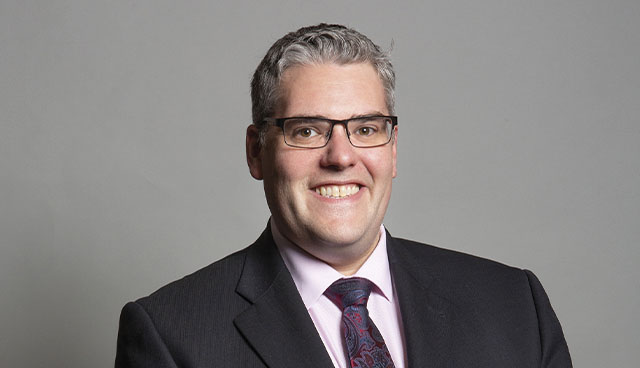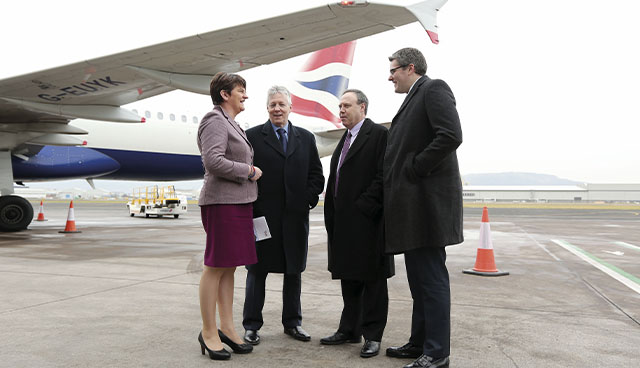Gavin Robinson MP: ‘We didn’t Brexit’

DUP MP Gavin Robinson talks to David Whelan about his role on the UK’s defence committee in the context of the invasion of Ukraine, his outlook on Stormont and his concerns with the Protocol.
East Belfast MP Gavin Robinson has never sought election to the Northern Ireland Assembly and yet he sees Stormont as “much more locally connected, much more relevant and of much greater import” than Westminster.
Robinson acknowledges that there is some within unionism losing faith in Stormont but emphasises that it is not a mindset that he shares, describing it as an “incredibly important political construct”.
“I truly place a value on Stormont working,” he explains. “It is my view that Stormont needs to work and that all sections of Northern Ireland’s community need to feel not only that they are part of the place but that their voices matter and that they can effect change.”
To this end, the MP does not rule out involvement in Stormont politics in the future. However at present, he is focused on his current role.
Robinson’s political career is now in its second decade, having served on Belfast City Council from 2010 to 2015, including as Lord Mayor, before election to Westminster in 2015, a feat he has repeated a further two times.
A typical working week for Robinson would see him travel to Westminster for parliamentary business on a Monday and typically stay until Thursday, where he would return to work in the constituency. However, with the business schedule only set on the previous Thursday, the MP’s schedule is often subject to change. He admits that being a parliamentarian can be difficult on family life. As a married father of one, he places great emphasis on time at home but admits that his schedule is often congested.
“Being at home often means being located in Belfast,” he says. “It doesn’t make family life easy, and the truth is that when you are back in your constituency it often means meetings in the evening beyond the working day and into the weekend.”
Despite the challenges, Robinson takes great pride in being the sole Westminster representative for Belfast East and sustaining that position for the past seven years. “Being a parliamentarian, representing a constituency is a wonderful thing to be able to do,” he states.
In his three terms at Westminster, Robinson has experienced dramatic shifts in the political landscape. Less than two years after entering parliament, he faced fresh elections, the outcome of which catapulted the DUP into partnership with the Conservative Government, with a confidence and supply deal that allowed government to sustain a working majority. In 2019, the Conservatives regained a strong majority, relegating the DUP back to opposition, but within months any hopes of stability were spurned by the outbreak of the pandemic.
Although he has served on Westminster’s defence committee for six years, Robinson’s role as the shadow DUP spokesperson on both defence and home affairs has been elevated in recent months following Russia’s invasion of Ukraine. Highlighting the committee’s role to scrutinise government and hold it to account, rather than take decisions, he believes that the committee’s role has never been so important.
Prior to the invasion, Robinson’s role on the committee oscillated between ensuring implementation of the Armed Forces Covenant in Northern Ireland and securing support for the defence industry, a large swath of which exists in his constituency.

The MP suggests that support for the industry goes beyond his constituency, highlighting its importance for Northern Ireland as a whole. A total of 27 companies in east Belfast are members of the Aerospace, Defence, Security and Space group (ADS) and Robinson has advocated that spending on defence should be a priority in the UK Government’s levelling up agenda, suggesting that the £2,500 per person spend on defence in the south east of England compared to the £30 per person spend in Northern Ireland shows great scope for growth.
In January 2022, prior to Russia’s invasion of Ukraine, Robinson told the House of Commons that he felt the Secretary of State for Defence Ben Wallace MP’s statement that, as Ukraine was not a member of NATO, the UK would not be putting troops on the ground if an invasion was launched, was an “incredible vulnerability” for the people of Ukraine.
“At such an early stage, being as open as suggesting that no matter what you [Russian President Vladimir Putin] do, we will not react, we will not commit to providing a repellent force, I thought that was a vulnerability,” the MP states.
Robinson believes that the early setting out of the UK’s position was a mistake. He says that the committee has been previously briefed that, following responses to events such as the Salisbury poisonings, “there are literally no sanctions left for our government to take that won’t harm our economy”. Robinson believes there has been an unwillingness for decades across UK governments to shut down “dirty money” in London from volatile states and actors.
Despite this, he has stopped short of advocating for the UK to deploy troops on the ground in defence of Ukraine. “I don’t think it is a simple conundrum,” he says. “I haven’t advocated for it and similarly, I haven’t gone so far as to say we should implement a no-fly zone because I see the real-world consequences of that. Emotionally it feels right but I don’t think Vladimir Putin operates in structured norms. You can see from the indiscriminate attacks on civilian populations that he is unlikely to meet force with equivalent force and so I don’t think you could be in a comfortable place to say we can go in and sort this out without wider consequences.”
The DUP
Robinson sits on the DUP’s officer team. His name was mooted for potential leadership of the party following the upheaval of Arlene Foster, but he contends that he himself never placed his name there. He is on record stating that he did not believe the removal of Foster happened in a “fair or honourable” way and admits that it was an “uncomfortable time” for the party.
“Sadly, some of that played out in the public sphere and that is not great but that was then, and this is now. Following Edwin’s [Poots] short tenure you had almost unanimous endorsement of Jeffrey Donaldson three weeks later and that is the basis on which we have been moving forward. Our officer team, our parliamentary party, our Assembly group, and our membership all recognise that we have a job of work to do and that that task and selection is much more important than any one of us.”
In March 2022, the party’s deputy leader, selected at the same time as Poots, announced that she will not seek re-election to Stormont in May due to family reasons. Paula Bradley is set to continue her membership with the party and continue in the deputy leader role until at least the party’s AGM in June 2022.
With the party’s leader indicating his intention to run in May’s Assembly election and return to Stormont, it is likely that the party will once again seek to split the leadership roles between Westminster and Stormont. If Robinson has any intention of seeking the deputy leader post come June, he gives no indication of it, instead expressing his disappointment but understanding at the electoral loss of Bradley, who he says was “a breath of fresh air” in many contributions and conversations.
On whether Donaldson’s switch to Stormont, if indeed it does happen, would change the dynamic of the party’s current parliamentary party at Westminster, Robinson says: “Jeffrey has been a parliamentarian for the past 25 years and he is a big part of our operation and parliamentary leader since 2019. He has built relationships, maintained relationships, and used them productively for the benefit of our province, and so, that will be a change, but that sort of change is not unique to us. That happens in politics.”
Protocol
With the First Minister Paul Givan MLA’s resignation in February 2021 partially paralysing the full functions of Stormont, there remains a question over whether even post-election the DUP will return to the institutions. Robinson is adamant the party wants to see Stormont work but says that the Northern Ireland Protocol is “hampering Northern Ireland’s ambition and prospects”.
“It is not working for us and with the way it is structured, it cannot work in the long term either. What we have at the moment doesn’t even scratch the surface in the sense that many of the propositions have been side-lined for grace periods and are not being fully implemented at this stage.”
Asked whether the absence of agreement to alter the Protocol between the UK and the EU prior to the Assembly’s expected return would see his party refuse to nominate for the post of First or deputy First Minister, he says: “The Protocol is impinging on all aspects of the political settlement we have in Northern Ireland. The north-south element is not working, and the Protocol drives a huge wedge down east-west relations as set out within the Good Friday Agreement. As a consequence, our political institutions are not operating as they should and unless there is a realistic approach on dealing with the Protocol, I don’t see how they will function successfully.”
Robinson believes that progress has been made over the past year, pointing out that “no one is talking about rigorous implementation anymore” and that the EU is engaged in negotiation. However, he rejects any suggestions that Northern Ireland’s unique position presents a ‘best of both worlds’ opportunity and instead believes that Northern Ireland’s market access to its main trading bloc is being impaired.
“This is not the best of both worlds at all. What we see in Northern Ireland, and it can only get worse unless the Protocol changes, is a loss of choice, an increase of costs or, as has happened in some cases, withdrawal from the market entirely. We have seen companies just refuse to send products from one part of our country to another.”
Reminded that his party campaigned for Brexit during the referendum and held significant sway with the UK Government for two crucial years of Brexit negotiations, Robinson says: “How tiring is it that when we are all suffering under the cosh of the Protocol, that people say, ‘ah well, sure isn’t it your fault?’. No, it did not have to be this way. It did not have to be a situation where Northern Ireland was cut off from its main market.”
Suggesting that the outworkings of the Protocol means that Northern Ireland “didn’t Brexit”, the MP laments: “We have been left behind in a situation where we have no democratic or legislative involvement in the rules that apply to us.”
In summer 2021, the UK Government published a White Paper in which it suggested the conditions had been met to trigger Article 16, a mechanism within the Protocol allowing either party to undertake unilateral safeguarding measures if the protocol leads to “serious economic, societal or environmental difficulties that are liable to persist, or to diversion of trade”.
Despite the DUP consistently calling for Article 16 to be triggered, to date the UK has failed to do so. The prospect of action by the UK prior to May’s Assembly election looks to have been stood down, as global relations focus on Russia’s invasion of Ukraine.
In this context, asked whether he still advocates for the triggering, Robinson concludes: “The position on the conditions being met have not changed. What is happening in Ukraine and the need for a level of unity across the continent of Europe is important but unless and until issues are met with a level of pragmatism by the European Commission and a resolution found, then it has to remain an option.”





